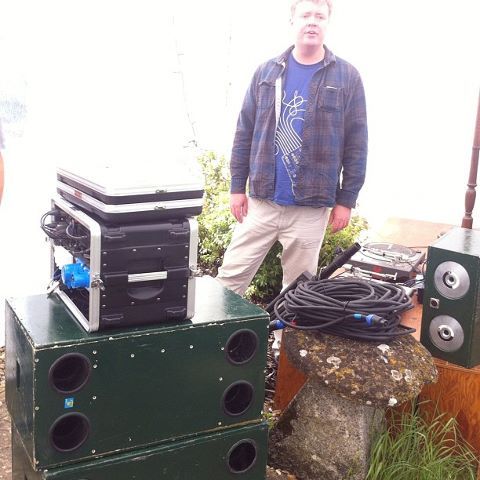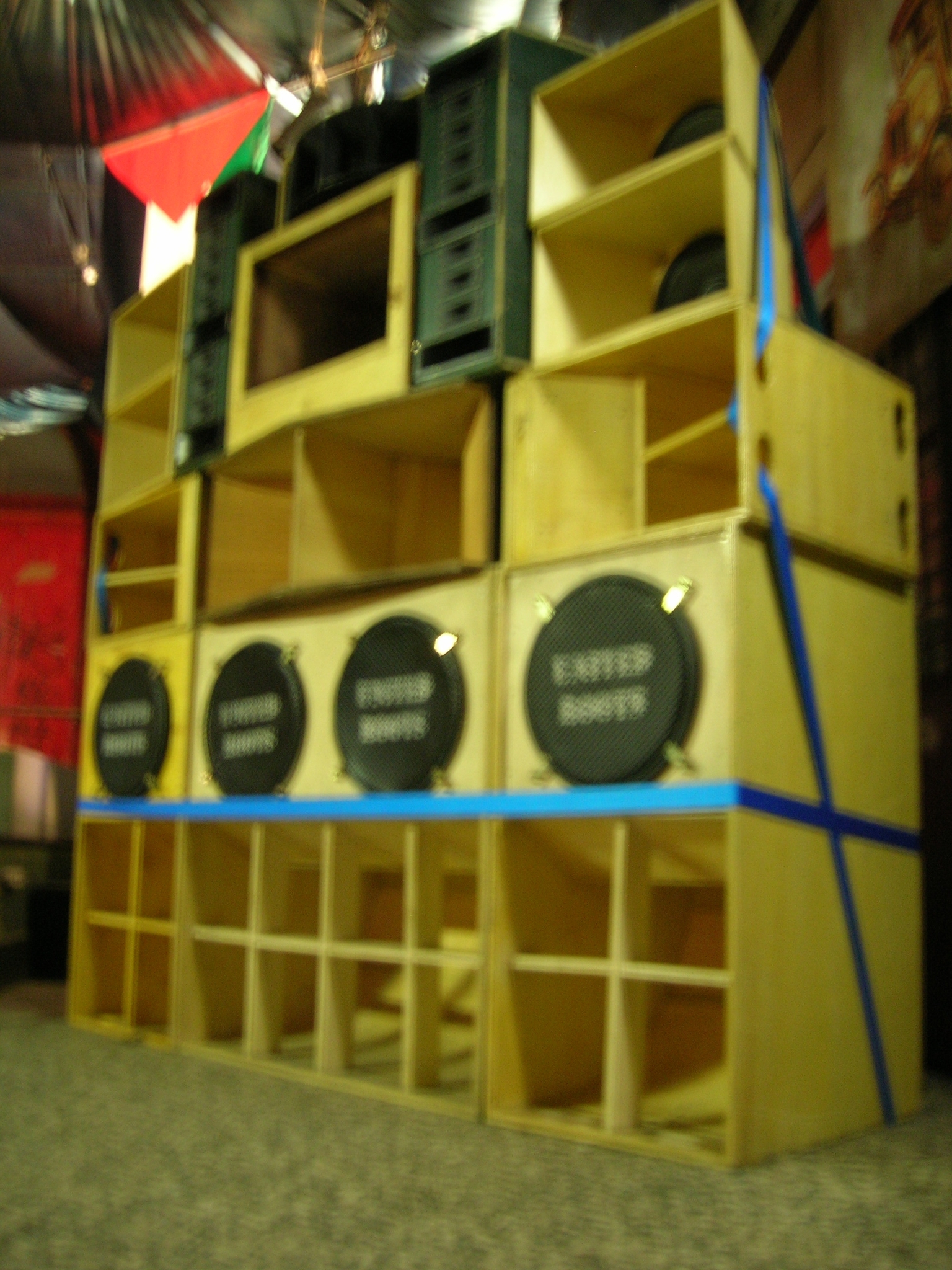- Posts: 236
- Thank you received: 0
MIGHTY DUB PASS MK2 (FSP-MDP)
- jsg
-

- Offline
- Elite Member
-

Are you sure you're plotting an 8th order bandpass? If so, I'd be interested to know which software you are using, since most programs don't do 8th order.
In terms of getting the port lengths right, you can always experiment with the model until the impedance lows match the resonant frequencies listed in the plan. This is how an actual cabinet would get tuned, and eliminates the errors with port length formulas. For sure, not much should be happening in any of the plots over about 150Hz.
Also, bandpass cabs are fussy about the drivers. Try one of the ones listed on the plan.
Edit: one other thing - your chamber volumes may be too small, might be worth double checking. Any chance of a screenshot of the input parameters?
Ars est celare artem
Please Log in or Create an account to join the conversation.
- bitzo
-

- Offline
- Platinum Member
-

- Posts: 637
- Thank you received: 1
Akabakjsg wrote: Hi
Are you sure you're plotting an 8th order bandpass? If so, I'd be interested to know which software you are using, since most programs don't do 8th order.
I'll try l18p300, what do you think about bms18n860?jsg wrote: In terms of getting the port lengths right, you can always experiment with the model until the impedance lows match the resonant frequencies listed in the plan. This is how an actual cabinet would get tuned, and eliminates the errors with port length formulas. For sure, not much should be happening in any of the plots over about 150Hz.
Also, bandpass cabs are fussy about the drivers. Try one of the ones listed on the plan.
Edit: one other thing - your chamber volumes may be too small, might be worth double checking. Any chance of a screenshot of the input parameters?
The script is complicate, I parametrized many values because of tuning, so is pretty dynamic so I need to make a legend on the plan, I'll publish it soon! smiley20
cheers
Please Log in or Create an account to join the conversation.
- jsg
-

- Offline
- Elite Member
-

- Posts: 236
- Thank you received: 0
I notice from the plot that the peaks and troughs are all reasonably similar SPL. This suggests a cabinet where the chambers and ports are in the right ratios. The 10dB peak/dip ratio would suggest driver/cabinet impedance mismatch (maybe change the BL or make an equal adjustment to all the chamber volumes). And as I mentioned the existence of peaks over 100Hz suggests everything is tuned too high, maybe lengthen the ports or enlarge all the chambers.
But I can only guess until I see the inputs. My software shows it fairly flat (slight ripples depending on which driver). It's the same software I use for my other subs. I had one measured at a meet last year and it came out pretty flat. The S15s I had at the last meet seemed OK, didn't measure them but a response like the one in your diagram would have been obvious.
One other thing: from the design, the port inertiences are lla=1.2 llb=3.5 llc=0.3. In my notation, ll is inertience measured as a multiple of the inerience of a square 10cm*10cm port measuring 10cm long, ignoring end correction. I.e. about 1.29 grams scaled to 100 square centimetre area. It's supposed to be the inertience equivalent of Vas etc. Compliances are a=57.4l b=140l c=260l
Ars est celare artem
Please Log in or Create an account to join the conversation.
- jsg
-

- Offline
- Elite Member
-

- Posts: 236
- Thank you received: 0
[attachment=0:1wn5wurc]<!-- ia0 -->dubpass_noport_rev2.pdf<!-- ia0 -->[/attachment:1wn5wurc]
Ars est celare artem
- bitzo
-

- Offline
- Platinum Member
-

- Posts: 637
- Thank you received: 1
edit: script corrected follow jsg tips
{
R1=50e-2/2; |radius chamber A
R2=30e-2/2; |radius port A
R3=17.5e-2/2; |radius port B
h4=60e-2; |cab width
w4=71.4e-2; |cab depth
R5=32.5e-2/2; |radius port C
thick=1.8e-2; |wood thickness
S1 = r1^2*pi; |duct area chamber A (sq cm)
S2 = r2^2*pi; |duct area port A(sq cm)
S3 = r3^2*pi; |duct area port B (sq cm)
S5 = r5^2*pi; |duct area port C (sq cm)
L12 = 26.50e-2; |depth A chamber (cm)
L23 = 10.5e-2; |depth A port (cm)
L34 = 36.5e-2; |depth B port (cm)
L45 = 76.5e-2; |depth chamber C (cm)
L56 = 10.5e-2; |depth port C (cm)
p34=l34/2; |depth port B into chamber C(cm)
p23=l23/2; |depth port A into chamber C(cm)
vd=11000e-6; |driver volume
vc=4500e-6;|cone volume
Lrc = 36.5e-2; |depth chamber B (cm)
Vrc = LRC*h4*w4-vd; |chamber A volume (litres)
Atc = 1892.00e-4; |Throat chamber cross-sectional area (sq cm)
Vtc = vc+atc*2*thick; |Throat chamber volume (cc)
|Parameter Conversions:
Sd = 1210.00e-4; |Diaphragm area (sq cm)
Arc = h4*w4;
Ltc = Vtc / Atc;
}
Def_Driver 'Driver'
Sd=1130.00cm2
Bl=23.50Tm
Cms=1.24E-04m/N
Rms=4.69Ns/m
fs=33Hz |Mmd = 190.63g not recognised by AkAbak, fs calculated and used instead
Le=1.9mH
Re=5.0ohm
ExpoLe=1
System 'System'
Driver Def='Driver''Driver'
Node=1=0=5=6
Duct 'chamber B'
Node=4=5
wd={w4}
hd={h4}
Len={Lrc}
vf={w4*h4*lrc-vd-s3*(l34-p34-thick)}
Visc=0
Duct 'Throat chamber'
Node=6=8
SD={Atc}
Len={Ltc}
vf={vtc}
Visc=0
duct 'chamber A'
Node=8=9
sd={S1}
Len={L12}
vf={s1*L12-s2*(L23-p23-thick)}
duct 'port A'
Node=9=10
sd={S2}
Len={L23}
duct 'port B'
Node=4=10
Sd={S3}
Len={L34}
duct 'second port B'
Node=4=10
Sd={S3}
Len={L34}
duct 'chamber C'
Node=10=11
wd={w4}
hd={h4}
Len={L45}
vf={L45*w4*h4-p23*s2-L12*(r1+2.5e-2)^2*pi-s5*(l56-thick)-(s3-thick)*p34*2}
duct 'port C'
Node=11=12
sd={s5}
Len={L56}
Radiator 'port C outlet'
Node=12
SD={S5}
Please Log in or Create an account to join the conversation.
- jsg
-

- Offline
- Elite Member
-

- Posts: 236
- Thank you received: 0
That looks mostly right, except I'm not sure all the chambers behave like ducts, particularly B. Have you tried asking Akabak to just model a lumped compliance?
Is the 11000e-3 figure in the Vf for chamber B the driver volume? In which case I think you want 11000e-6 since everything else is in cubic metres.
Just for interest, here's the C code I wrote to compute chamber volumes from dimensions. It's all in decimetres (multiples of 10cm) which seems rubbish except when you multiply 3 of them you get litres, which is nice.
double thick = 0.18;
double athick = 0.25;
double h_int = 12.2 - thick*2; // 11.0
double w_int = 6.36 - thick*2;
double d_int = 7.5 - thick*2;
double h_b = 3.85; //3.75
double h_a = 2.65; //2.55
double ad_int = 5;
double a_bracing = 0; // "A" chanber unbraced
double b_bracing = 3;
double c_bracing = 5;
double v_magnet = .6*2.8*2.8/4*3.14159;
double v_cone = 1.28 * 4*4/4*3.14159 / 3; // depth*area/3 for a cone
double v_ap = 0; // centred
double v_bp = 1.75*1.75/4*3.14159 * 2 * 1;
double v_cp = 3.25*3.25/4*3.14159 * 0.5;
printf( "v_magnet=%lf v_cone=%lf v_bp=%lf v_cp=%lf\n", v_magnet, v_cone, v_bp, v_cp );
double v_b = (h_b-thick)*w_int*d_int - v_magnet - v_cone - v_bp - b_bracing; // double paqnel at top
double v_a = h_a * ad_int*ad_int/4*PI + v_cone - v_ap - a_bracing;
double v_c = (h_int-h_b-thick*2)*w_int*d_int -
h_a * (ad_int+athick*2)*(ad_int+athick*2)/4*PI
+ v_bp + v_ap - v_cp - c_bracing;
printf("a=%lf b=%lf c=%lf\n", v_a, v_b, v_c );
I have to go out tonight, I'll look again tomorrow.
Edit: one other thing, the volumes I use include 50% of the internal volume of any ports going into that volume. Air in ports is under pressure; it will compress. I assume the pressure inside the port is a linear progression from the pressure at one end to the pressure at the other. So I'm only accounting for ports that are off-centre, ie more in one chamber than the other. This is the sort of thing you pick up if you've done bandpasses for as long as I have smiley1
Ars est celare artem
Please Log in or Create an account to join the conversation.
- bitzo
-

- Offline
- Platinum Member
-

- Posts: 637
- Thank you received: 1
Anyways I updated the script with correction. Thanks!
What do you mean for lumped compliance? And also...not clear at all the inertiences concept.. sorry but I'm quite dumb.jsg wrote: Hi
That looks mostly right, except I'm not sure all the chambers behave like ducts, particularly B. Have you tried asking Akabak to just model a lumped compliance?
I don't think that akabak takes care of the alignement. Is The linear progression a good thing? I mean for distortion.jsg wrote: Edit: one other thing, the volumes I use include 50% of the internal volume of any ports going into that volume. Air in ports is under pressure; it will compress. I assume the pressure inside the port is a linear progression from the pressure at one end to the pressure at the other. So I'm only accounting for ports that are off-centre, ie more in one chamber than the other. This is the sort of thing you pick up if you've done bandpasses for as long as I have smiley1
However it will reach the resonances with some tweaking smiley2
Please Log in or Create an account to join the conversation.
- jsg
-

- Offline
- Elite Member
-

- Posts: 236
- Thank you received: 0
R1=50e-2/2; |radius chamber A
But the measurement you've got there of 50cm is really the diameter, the radius is 25cm.
I notice there's a front chamber in the design - you could get rid of this since the "A" chamber serves as front chamber.
Another question: do you have the airload set to half-space? and have you set the number of units to 4? OK that was 2 questions.
Ars est celare artem
Please Log in or Create an account to join the conversation.
- bitzo
-

- Offline
- Platinum Member
-

- Posts: 637
- Thank you received: 1
yes...50 cm divided by 2...I'm too lazy to calculate radius by myself smiley17jsg wrote: We're getting closer! I notice the Akabak script has some measurements like this one:
R1=50e-2/2; |radius chamber A
But the measurement you've got there of 50cm is really the diameter, the radius is 25cm.
I use 2 front chamber, one is the cone volume, the other is chamber A. In that way I can tune the chamber A separetely from the "cone chamber", without messy correction you know..jsg wrote: I notice there's a front chamber in the design - you could get rid of this since the "A" chamber serves as front chamber.
[/quote]jsg wrote: Another question: do you have the airload set to half-space? and have you set the number of units to 4? OK that was 2 questions.
Akabak can sim only at half space, to sim a stack of four....uhmm the simple way is copy this script 4 times ( a part the definition section) and changing the driver name for each copy.
Please Log in or Create an account to join the conversation.
- jsg
-

- Offline
- Elite Member
-

- Posts: 236
- Thank you received: 0
I see you've done this and subtracted intrusions. But if Akabak is using your vf figure for the volume in the duct, what is it doing with wd, hd, sd, Len?
Edit: just looked at Ak docs. Turns out vf is added on to the duct volume (it's a front-chamber for when the duct is narrow). I think that means the compliances for each chamber are appearing twice: once in the wd*hd*Len and again in the vf. I suggest getting rid of all the vf (they're optional) and maybe cheat down the sd, hd, Len a little bit to account for intrusions.
The "lumped compliances" I mentioned earlier are supported in Akabak as AcouCompliance, maybe worth giving those a go as well.
Ars est celare artem
Please Log in or Create an account to join the conversation.
